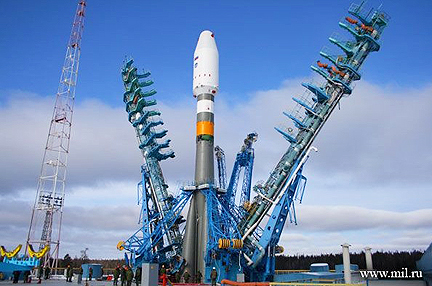
Photo of the Soyuz 2 launch vehicle
The maiden flight of a Soyuz from Europe's space base will go ahead as scheduled on October 20, as it is a different version from the rocket involved in Wednesday's Russian launch failure, Arianespace said on Thursday. "The problem that occurred [in Russia] is linked to a third-stage motor, and the Soyuz model that we will be using uses a different third stage," Jean-Yves Le Gall, president and chief executive of the launch company, told AFP. "It is not the same version of the rocket."
The European Space Agency (ESA) and Russia are deploying Soyuz at Kourou, French Guiana, under a 2003 accord to provide a mid-sized launcher for Arianespace, which markets ESA's launch vehicles. The model that will be deployed there is a Soyuz-ST, a spinoff of the Soyuz-2. It is designed to take nearly three tonnes into geostationary transfer orbit. Its first flight will lift the first two satellites in Europe's Galileo navigation system, the competitor to the U.S. Global Positioning System (GPS).
An unnamed Russian official told the Interfax news agency on Thursday that "the launch of Soyuz carrier rockets" had been suspended until the loss of a unmanned craft taking cargo to the International Space Station (ISS) had been explained. The move has caused a ripple of concern for the crew of the ISS, as the Soyuz, a workhorse of space for half a century, is used both as a launcher for cargo and for passenger vehicles. If the Soyuz-launched Progress freigher is out of operation, that will leave the ISS with ESA's Automated Transfer Vehicle (ATV) and Japan's H-II Transfer Vehicle (HTV). The latest ATV, Edoardo Amaldi, is currently being brought by ship to Kourou.
"Its scheduled launch is February 28 2012," said Le Gall, who said there was "a small margin" for bringing it forward if need be, but this would only be by a few days given the tight schedule. The ISS has capsules moored to the station enabling all crew onboard to return to Earth, either on scheduled missions or in an emergency.

